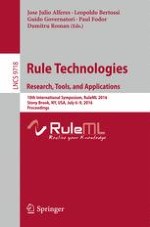2016 | OriginalPaper | Buchkapitel
A Declarative Semantics for a Fuzzy Logic Language Managing Similarities and Truth Degrees
verfasst von : Pascual Julián-Iranzo, Ginés Moreno, Jaime Penabad, Carlos Vázquez
Erschienen in: Rule Technologies. Research, Tools, and Applications
Aktivieren Sie unsere intelligente Suche, um passende Fachinhalte oder Patente zu finden.
Wählen Sie Textabschnitte aus um mit Künstlicher Intelligenz passenden Patente zu finden. powered by
Markieren Sie Textabschnitte, um KI-gestützt weitere passende Inhalte zu finden. powered by
